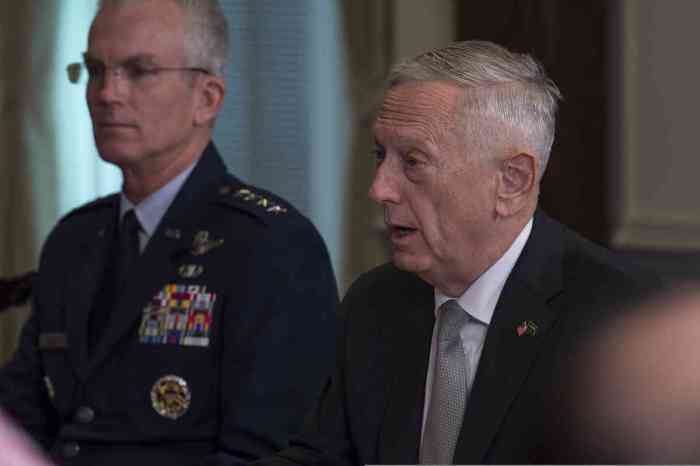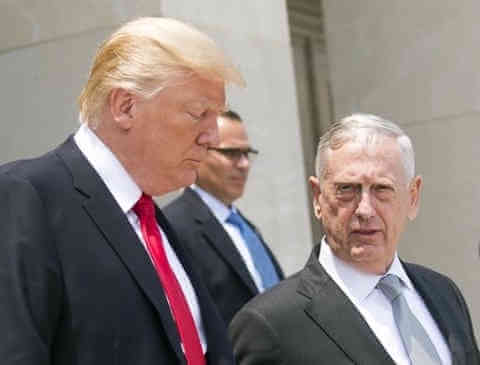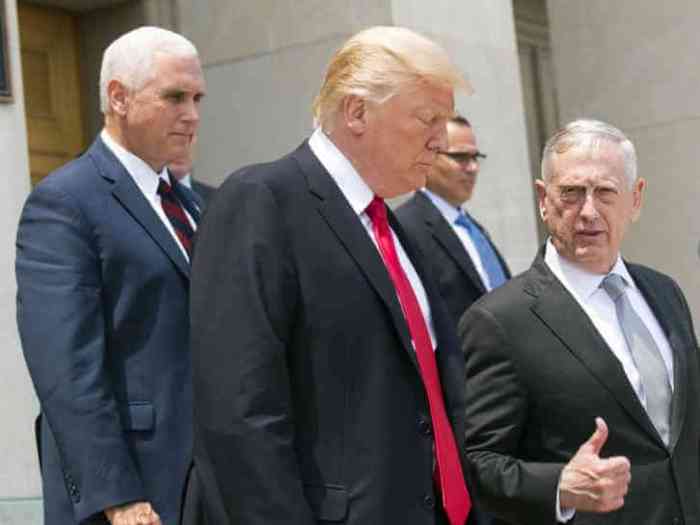On the date Donald Trump's proposed ban on transgender service in the military was due to go into effect, the DOJ is stonewalling a federal court order that it reveal what “generals” and other “military experts” the president relied on in announcing his policy last summer. | DEFENSE.GOV
With President Donald Trump’s new policy on transgender military service due to have taken effect today, the Department of Justice is essentially refusing to comply with a March 20 federal court order that the White House reveal the identity of the “generals” and other “military experts” the president purportedly consulted prior to his Twitter announcement last July 26 that trans people would not be allowed to serve in any capacity in the armed forces.
Following that tweet, last August 25 Trump issued a memorandum to the secretaries of Defense and Homeland Security, directing that effective this March 23 transgender service would be barred. Defense Secretary James Mattis was charged with submitting an implementation plan for the new policy to the White House by February 21.
What Mattis submitted on February 23 has not been made public. Meanwhile, US District Judge Marsha J. Pechman in Seattle, presiding over a lawsuit filed last fall by Lambda Legal and Outserve-SLDN challenging the proposed policy, denied DOJ’s motion to dismiss that case and granted the plaintiffs’ motion for a preliminary injunction against a new policy going into effect. That injunction was based on the conclusion the policy was likely to be found unconstitutional and that preventing its implementation was necessary to protect the legitimate interests of people who would be adversely affected.
Department of Justice refuses to disclose what generals and experts advised president on proposed ban
When discovery in the case began, DOJ refused to comply with the plaintiffs’ request for the identity of the “generals” and “experts” Trump claimed to have consulted. The government argued that its case would not rely on any testimony or documentation from those individuals, since they would not be defending Trump’s August 25 policy announcement, but rather a new policy yet to be announced based on Mattis’ recommendations.
When plaintiffs requested an order that the White House identify the experts, Pechman, in an opinion issued on March 14, wrote that “this case arises not out of any new or future policy that is in the process of being developed, but rather out of the current policy prohibiting military serve by openly transgender persons, announced on Twitter by President Trump on July 26, 2017, and formalized in an August 25, 2017 Presidential Memorandum.”
Dismissing the government’s claim that none of the experts the president alluded to have information relevant to his policy, she continued, “President Trump’s own announcement states ‘after consultation with my Generals and military experts, please be advised that the United States Government will not accept or allow… Transgender individuals to serve in any capacity in the US Military.”
Pechman then asked, “Which Generals and military experts were consulted? Which Service Chiefs and Secretaries provided counsel? What information did they review or rely upon in formulating the current policy?”
Then, pointing to the evidence provided to date by the government, she wrote, “The answer to these questions apparently would be ‘none.’”
Pechman gave DOJ five days to comply.
DOJ responded by seeking “clarification” and raising the prospect the president could invoke “executive privilege” to refuse to comply, in order to protect the confidentiality of presidential deliberations.
Responding to this argument early on March 20, Pechman issued a new opinion, writing, “The Court cannot rule on a ‘potential’ privilege, particularly where the allegedly privileged information is unidentified,” and pointed out that DOJ had not invoked executive privilege earlier in the litigation.
“In order to assert privilege, a party must ‘expressly make the claim’ and ‘describe the nature of the documents, communications, or tangible things not produced or disclosed — and do so in a manner that, without revealing information itself privileged or protected, will enable other parties to assess the claim,’” she noted.
Responding to the government’s contention that “considerable deference” is owed to “the complex, subtle, and professional decisions” that went into the president’s new policy, Pechman found that Trump must show his policy was adopted as a result of “professional decisions” and not based solely on his political concerns.
The refusal to disclose what advice the president relied on leads to the inevitable conclusion that either such consultations did not take place, as Pechman intimated on March 14, or if they did that the president was acting against the advice of his generals and military experts. By last summer, military commanders with a full year of experience in having openly transgender personnel would know that the policy implemented by the Obama administration effective the beginning of July 2016 had not led to any problems with good order, morale, or substantial health care costs.
Pechman gave DOJ until the end of the day on March 22 to comply with her discovery order, and DOJ submitted its statement refusing to do so shortly before that deadline. Once again, the government contended it does not intend to defend last summer’s policy pronouncements and so was not required to disclose any of the experts who advised on it.
As the time of this writing on March 23, the White House has made no indication that an implementation policy or a revised version of last summer’s policy is set to be announced. This is not surprising, since three other federal district judges in addition to Pechman have issued preliminary injunctions against implementation of the new policy and two federal courts of appeals — the DC and the Fourth Circuits — rejected DOJ petitions to stay preliminary injunctions.
In light of those injunctions, issued last fall, the Defense Department notified its recruitment staff in December that it would begin processing transgender applicants on January 1, six months after the original Obama policy was due to fully take effect — that six month delay announced last summer by Mattis prior to Trump inserting himself into the issue. According to the Pentagon, at least one transgender applicant has now completed the enlistment process.
The DOJ may be going down a slippery path by arguing that the existing injunctions and lawsuits are irrelevant because the president’s August 25 memorandum never went into effect and, as the result of Mattis’ undisclosed recent recommendations, never will. Meanwhile, thousands of transgender military personnel — many of whom have identified themselves publicly since former President Barack Obama announced service would be opened up to them — find their employment status in a state of uncertainty.
Some hint of where Mattis’ thinking on the issue is might be found in the enlistment policies the Pentagon announced in December, which opened up service to transgender individuals only if they have been “stable” regarding their gender identity for at least 18 months. That requirement may be aimed at mitigating concerns — which are vastly exaggerated — about the potential cost of gender reassignment surgery, with the period of gender identity stability seen as a proxy for the unlikelihood that significant additional transition expenses will be incurred.
Trump’s initial July tweet came shortly after the House of Representatives rejected a Defense Department spending bill amendment that would have blocked the funding of “sex reassignment surgery” for military personnel. Some conservative Republicans at the time warned the president he would not get the votes to pass the underlying spending measure itself unless that provision was in it. Trump’s apparent solution to his immediate political problem was to bar all transgender military service. DOJ may now be attempting to bury the fact that Trump probably lied in his tweet when he asserted his policy change resulted from recommendations by generals and military experts. The government’s stonewalling on disclosure leads to Pechman’s obvious conclusion that she stated on March 14.


































